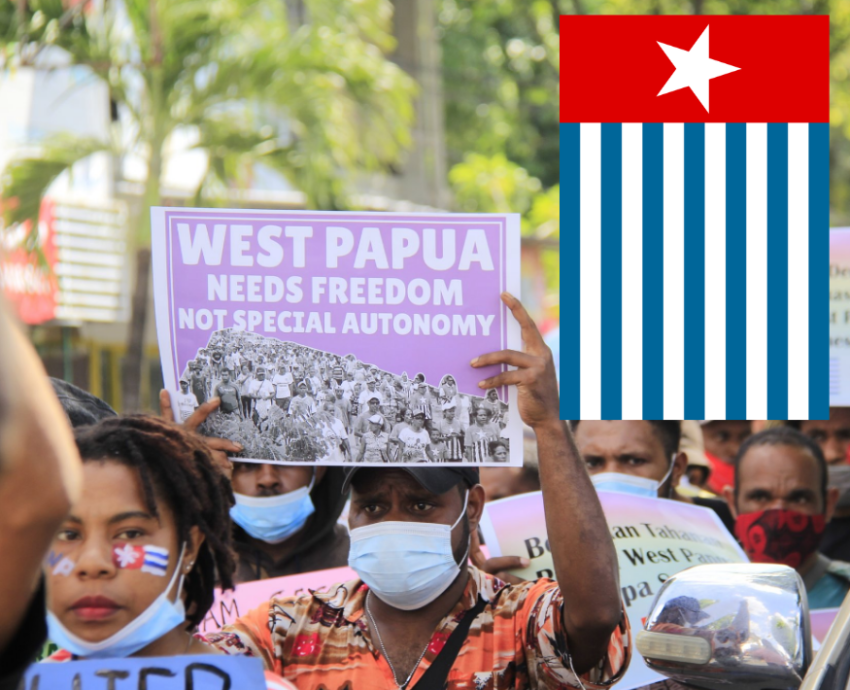
On December 1, all around the world, supporters of the long struggle for West Papuan self-determination raised the Morning Star flag of independence. In the Indonesian-occupied territory, Papuans braved arrest and police violence, because authorities treat raising the flag as an act of treason.
Thirty-six people were arrested in Manokwari and Sorong, in West Papua, on November 27, after raising the banned flag. Two Papuan high school students were shot (one fatally) on November 20 by an Indonesian paramilitary unit trained by the Australian Federal Police (AFP) and now war crimes-notorious Special Air Services Regiment (SAS).
This year, December 1 was also marked by the announcement by the United Liberation Movement for West Papua (ULMWP) that it had begun to form a provisional government-in-exile.
The ULMWP was formed in 2014 at a meeting of leaders of three major factions of the West Papuan liberation movement in the South Pacific nation of Vanuatu.
The provisional government aims to mobilise the people of West Papua to achieve a referendum on independence, after which it will take control of the territory and organise democratic elections. Indonesian repression currently renders elections impossible, the ULMWP said in a statement on December 1.
“This move is a direct rejection of Jakarta’s attempts to extend ‘Special Autonomy’ provisions in West Papua,” said the ULMWP. “‘Special Autonomy’, first imposed in 2001, will expire at the end of the year, and is the target of a mass petition sponsored by 102 civil society organisations across West Papua.”
A new provisional constitution for West Papua “centres environmental protections, social justice, gender equality and religious freedom, and protects the rights of Indonesian migrants living in West Papua,” the statement said.
“The Constitution establishes a governance structure, including the formation of a Congress, Senate and judicial branch.”
The provisional government says it has the support of all liberation groups inside West Papua, representing the overwhelming majority of the people.
Last year, the ULMWP delivered a petition – signed by 70% of West Papuans – calling for a UN-supervised referendum on self-determination to the UN High Commissioner for Human Rights.
The ULMWP announced that the West Papuan state-in-waiting will be represented internationally by an interim President, Benny Wenda, a West Papuan exile based in Britain.
The rest of the cabinet will be announced in the coming months.
The provisional government plans to make a Unilateral Declaration of Independence (UDI) at an appropriate time, on behalf of the people of West Papua.
“Today, we honour and recognise all our forefathers who fought and died for us by finally establishing a united government-in-waiting,” said Wenda. “Embodying the spirit of the people of West Papua, we are ready to run our country.”
“As laid out in our Provisional Constitution, a future Republic of West Papua will be the world’s first Green State, and a beacon of human rights – the opposite of decades of bloody Indonesian colonisation. Today, we take another step towards our dream of a free, independent and liberated West Papua.”
Meanwhile, in Melbourne, a group of West Papua solidarity activists climbed onto the roof of the Indonesian Consulate on December 1 and dropped large banners with the Morning Star flag and the demands: “TNI Out: Stop Killing Papuans” and “Free West Papua”.
Australian solidarity activists are campaigning to end Australia's military and political support for the Indonesian occupation of West Papua.
Dr Jason MacLeod, an Australian-based activist with the Make West Papua Safe campaign, said there were “disturbing similarities” between the tactics used by Indonesian paramilitary and special forces units in West Papua and those used by Australian special forces in committing war crimes in Afghanistan.
Make West Papua Safe said ex-SAS officers are part of the training team at the Jakarta Centre for Law Enforcement Cooperation (JCLEC) where, alongside the AFP, the CIA and former British special forces, they have trained more than 21,000 Indonesian police.
Those trained include the counter-insurgency group Special Detachment 88 and the paramilitary police BRIMOB, which is routinely accused of human rights violations, including the murder of children.
Since the SAS and the AFP began training the Indonesian police at JCLEC, human rights organisations, including Amnesty International Indonesia, have reported that human rights violations, including torture and extra-judicial killings in West Papua, have become considerably worse.